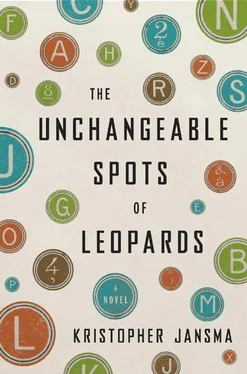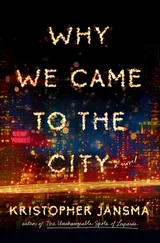The Pink Packet Thieves was universally adored by the women in the terminal, and for a few days I had my first taste of a writer’s celebrity. But I was not really a writer — not yet. Not even then. Mr. Humnor said that if we made copies and put them up for sale in his shop we could split the profits. For a night or two I dreamed of the hundreds of dollars I would surely make — perhaps even enough so that my mother could retire and we could fly around the country together.
One person hadn’t seen the book yet. That was Mr. Bjorn and there was no one in the concourse whom I wanted to like the book as badly. For days I watched him, waiting for my moment, and finally I walked over, on a slow Tuesday afternoon that summer, to offer him my story. I don’t remember finding it strange that, on this day, he was reading the newspaper in his high chair and not standing.
“You get any bigger yet? You ready to put one of those links back in?”
“I wrote a book,” I said meekly, as I held it out.
“So you have,” he said, squinting down at it for a moment. His hands were shaking and he kept sort of clearing his throat.
“You could read it,” I explained, as I pushed it toward him.
He lifted it up, made a little show of admiring the title and the cover art, and released a familiar fluttery whistle. “I’ll take a look at it as soon as I’m done with my paper. One hour, son. All right?”
I agreed, happy to see him smiling. “A book,” he laughed as he set it down. “Sounds like someone wants to live forever.”
I didn’t know what he meant by this but I didn’t care. I rushed off again through the concourse, giddy with pleasure, and I did not stop running until I reached Emerson Books and snatched three candy bars while Mr. Humnor pretended not to look. I camped out there, beneath the rotating rack of romance novels, watching the little hands on my wristwatch twisting slowly around, the little ticking of the escapement seeming to grow louder and louder.
When an hour had finally passed, I rushed out of the store and followed a crowd of passengers to the other end of the concourse. When I got there I was surprised to see a crowd massed around Mr. Bjorn’s shop. Ms. Barlow and Mrs. De Santos and Mrs. Nederhoffer were all there, but Mr. Bjorn was not. His high chair was on the ground, on its side. His newspaper lay in a heap beside it.
“Old guy’s ticker just stopped,” I heard a rough voice say. It was a policeman — a blue pudgy ball with a buzz cut — and he was holding my book in his hand. And he was laughing. Not like Mr. Humnor laughed. Laughing as though he thought something was awful. And all of my daytime minders were just standing there, letting him laugh.
“Was this the old guy’s?” the officer asked, that horrible smile still on his face.
“No,” said Mrs. Nederhoffer. “It’s just this little boy’s. His mother’s one of the flight attendants, and she leaves him here all day like it’s some sort of day-care center.”
“We all sort of look after him,” Mrs. De Santos chimed in. “Honestly, I live in fear every day that some nut will run off with him.”
Ms. Barlow agreed, loudly, that if one ever did, it wouldn’t be on her chest.
The officer laughed — a hacking, barking sort of laugh. “No father?”
This time the ladies laughed — their cackles were high and excited — as if there were nothing they liked to laugh about more. They all began talking at once, and I heard them say bad words before I could hold my watch up to my ears. Soon I couldn’t hear anything but the ticking. I stood there in a dark forest of strangers’ knees, listening to second after second, escaping. Then with one careless motion, the policeman chucked my book into the nearest trash can. None of the ladies even noticed.
I started running away, back down the concourse. At first I meant to hide back at Mr. Humnor’s, but when I got there it still wasn’t far enough. Leaping down the escalators, the concourse rose up around me, and below were the great snakelike conveyor belts that slowly ferried luggage to waiting crowds. I kept on running, out past the big orange car rental sign and through the revolving glass doors. I ran down the sidewalk past the taxicabs and the luggage collectors in their red caps. I didn’t know where I was going or where I wanted to go. I wanted to go wherever my mother was, or wherever Mr. Bjorn had gone. I wanted to go where all the seconds went.
I stopped when I saw a sign pointing inside again. TERMINAL A it said. Timidly, I went inside and up some more escalators to the concourse level. Finally, I would see it. Terminal A. And maybe I would find Mr. Bjorn, winding all the timepieces backward, with the same serious smile. The little round tables were the same. The linoleum floor was the same. The skylights high above me were the same. But there was no Emerson Books. There was no Phil’s Coffee. There was no W. W. Gould’s, and there was no Ten-Minute Timepiece Repair. There was no Mr. Bjorn.
Finally, I sat down on the ground under a long row of clocks. There were ten of them — each exactly the same except for a little sign that said the name of a place. Some of these places I’d read about, like Paris, where Xavier and Yvette had come from. And some I’d heard of, like Mexico City, where Mrs. De Santos was born. These were places that were very far away, I knew. And they all had different times from the time on my watch. In Mexico City, it was still an hour earlier. If I were there, I figured, and it was an hour earlier, then Mr. Bjorn would still be around.
I sat there listening to the clocks’ little ticking noises. Inside each were little gears like the ones inside my watch, struggling and turning. I listened to the seconds escaping. And I knew then that each second was just escaping to a different clock, somewhere even farther away, and that the seconds just went on and on escaping like that, forever.
• • •
So. That is the story of how I lost my very first book. I’ve lost three others since — a novel, a novella, and a biography. The first is disintegrating steadily at the bottom of a black lake. The second is in the hands of a woman whom I love and will never see again. The third is in a dusty African landfill, wrapped in the bloody tatters of my tweed coat, my gold watch still in the pocket.
Only fragments remain, which I’ve carried with me around the world and back again. Sitting here in Terminal B, setting them beside one another, I’ve been trying to get them to add up to something true. I’m staring at the margins between them — just an inch on each side — but the distance may as well be the Grand Canyon. Yet I feel certain that somewhere in this empty space, between my lies and fictions, is the truth.
It occurs to me, as I finish writing this, that perhaps these surviving pieces aren’t so different from those clocks in Terminal A. In each of them you can see what the time would be, but only somewhere else. Between them all, you can, if you wish, determine what time it is here.
• • •
These stories are all true, but only somewhere else.
What can be said at all can be said clearly, and what we cannot talk about we must pass over in silence.
— LUDWIG WITTGENSTEIN, TRACTATUS LOGICO-PHILOSOPHICUS
The autumn of my sixteenth birthday, I worked after school and on Sundays, serving apfelstrudel and einspänners at Ludwig’s Café in the Raleigh Museum of Art. Sundays were the best days for tips, because all the patrons getting out of church were feeling simultaneously undercaffeinated and overcharitable. Before the bells were done ringing, all the most affluent ladies in North Raleigh were rushing over from Methodist Saints United, wearing hats that my buddy Rodrigo said ought to be in the abstract art exhibits. But the real reason I looked forward to Sundays was that the Terpsichorean Society held its debutante classes in the event space across the hall, and while the well-heeled mothers lost track of time gossiping at Ludwig’s beneath the golden Portrait of Colette Marsh , Rodrigo and I would go back to the storeroom window and stare at the debutantes.
Читать дальше











